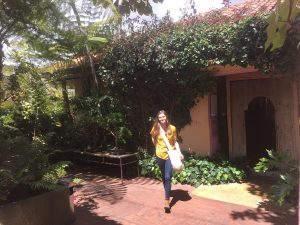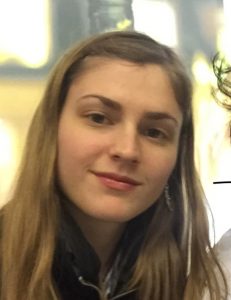Emerson Grad Heads to Colombia to Report on Art, Indigenous Culture
A member of the Arhuaco community selling coca leaf products, including coca cream and coca chocolate, at Expoartesanias, an artisan fair in Bogota. Photo by Margaux Maxwell.
By Hannah Lacava, G’20
After graduating with degrees in Journalism and Global & Postcolonial Studies, Margaux Maxwell ’18 took her passion for international human rights to Bogota, Colombia, where she is working as a freelance journalist.
Emerson Today caught up with Maxwell via email this past week.
What inspired you to move to Colombia after graduation?
I’ve had the opportunity to work in wonderful teams on a lot of international projects while studying as an undergraduate. My initial dream was to work as a foreign correspondent in the human rights field, and I’ve always been really eager to learn about the world around me, so I focused on applying for a lot of fellowships and grants for reporting projects abroad. From Mongolia to Cuba to Albania, the world has been my classroom for journalism in college, and I’m so grateful for that.
While I have loved reporting abroad with so many amazing writers, I really wanted to do my own project as sort of a capstone for my education after graduation. So I wrote a grant for a freelance journalism project and got in touch with [environmental news website] MongaBay about my proposal. I didn’t want to pitch myself as a student, but as a writer. I wanted to kind of assess my skills and really put to use everything I’ve learned over the past four years, and I was really excited when I got funded to do a project [and get published] with them.
I think Emerson really prepared me for that. At Emerson, you absolutely have the freedom to make your education your own, from projects to essays to classes. Teachers at Emerson are so receptive to that and they want to work with you to shape you in the direction you’d like to go.

Tell us a little bit about your project with MongaBay and the other work that you’re doing.
The article I wrote for MongaBay delves into the history of a Colombian indigenous tribe, which is now struggling to destigmatize the coca leaf (the leaf used to make cocaine) following the 52-year civil war in Colombia. It was a really amazing experience to use all the reporting skills I’ve gained to put something together that I’m really proud of.
Right now, I’m working as a freelancer. So I’m looking around for story ideas and pitching them. It’s a really interesting time to be in Colombia during the peace process after the war, so it’s been amazing hearing all these stories that just a few years ago people might not have been able to tell. I’m also hoping to improve my Spanish-speaking skills! It’s a work in progress.
What has been the most rewarding part of your experience? The most challenging?
Writing is what I’ve always loved, so it’s amazing to be able to do that for work.
Working out the finances can be tricky as a freelancer, but one trick I’ve learned is that if you have ESL skills you can teach English from home via Skype to a student in almost any country. I have found clients from various sources and it’s been a really great way to supplement my income and a really rewarding experience! The kids are adorable and eager to learn, and in exchange, I’ve been able to learn about their language and culture, too. I’m really passionate about education for girls globally, so that’s a way I get to contribute to that mission.

What does an average day look like for you?
Waking up and eating altogether too much maracuya and guanabana fruits before I face New England’s lack of fruit in the winter … and have to wait until the summer! Then meeting with various people for interviews I’ve set up and going to particular locations for stories.
Most recently, I went to the Doris Salcedo exhibit to write about it. She’s a well-known Colombian artist who used melted-down weaponry from the war to create a monument in the form of a floor. It’s a really striking exhibit. When I have free time, there are some absolutely wonderful bookstores in Bogota. The Gabriel García Márquez Cultural Center has a fantastic collection of books. I’ve met really excellent people here as well.
What has been the most surprising thing you have learned abroad?
Colombia has a really beautiful, rich history that’s been incredible to delve into and that I think more people should know about. This country will surprise you in all the right ways — it is a hugely diverse country with many generous, wise, deeply humorous and fascinating people that are full of stories to tell you.
Maxwell’s recently published report on the indigenous Tayrona Arhauco community and their struggle to destigmatize the coca leaf can be found here:
Categories